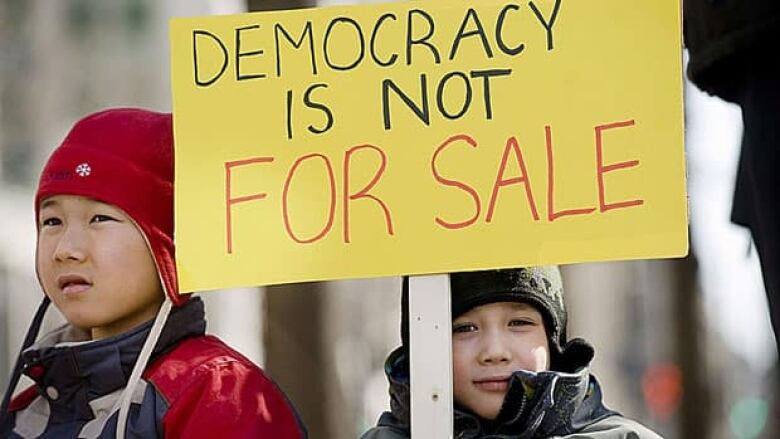9 facts about Pierre Poutine and the robocalls case

UPDATE: This story was updated April 3, 2013,to add thenews ofa charge laid against former Guelph Conservative campaign worker Michael Sonaand to update some information below.
In 2011, Elections Canada investigatorsbegan probing calls placed to voters in Guelph, Ont. in the final days of the 2011 federal election that wrongly claimed to be from Elections Canada.The callsredirected voters to a polling station they couldn't use.
It's illegal both tointerfere with a person's right to vote and to impersonate Elections Canada.
Now, with word that former Guelph campaign worker Michael Sona faces a single charge in the affair that has come to be know as the robocalls scandal, here's a look at what we know about the case, according to court documents and information provided in interviews:
1.Elections Canada investigator Al Mathews started looking into complaints in Guelph on May 5, 2011,three days after the election that saw reports of illicit phone calls. The winning candidate in the riding, Liberal Frank Valeriote, compiled a list ofalmost 80 names of people complaining about the calls.News of the investigation didn't break untilFeb. 22, 2012.
2.All political parties use automated robocalls and live calls to identify voter support and contact people during a campaign. The campaign of Guelph Conservative candidate Marty Burke used RackNine, a company that offers voice broadcasting services, to make legitimate robocalls to campaign supporters. The person who made the fraudulent robocalls also used RackNine.

3. The person who made the calls used a disposable, or burner, cellphone,registered to a"Pierre Poutine." The RackNine charges were paid via PayPal using prepaid credit cards, purchased attwo Shoppers Drug Mart storesinGuelph. Shoppers Drug Mart doesn't keep its security camera videos long enough to see who bought the cards more than a year ago.
4. Elections Canada traced the IP address used to access RackNine on election day and send the fraudulent message.Mathews got a court order for Rogers, the company that provided the internet service to that IP address, toprovide the customer informationthat matches that address, on March 20, 2012.
5. Pierre Poutine and Burke campaign worker Andrew Prescott accessed their RackNine accountsusing the same IP address. On election day, they accessed their RackNine accounts from the same IP address within four minutes of each other, Mathews says in documents filed in court.
6. A court document lists the billing account numbers for the customer information provided by Rogers to Mathews. Those accountsdon't match the number found on the Burke campaign's Rogers invoices submitted to Elections Canada, suggesting RackNine wasn't accessed througha computer in the Burke campaign office.
7. Two Conservative staffers, accompanied by the party's lawyer,told Mathews they overheard Michael Sona, another Burke campaign worker, talking about "making a misleading poll moving call." Sona, who stepped down from a job in the office of Conservative MP Eve Adams when the story broke, has previouslysaid he had nothing to do with the misleading calls. Mathews later corrected the record, adding a footnote to asubsequent courtdocument that said campaign worker Matthew McBain actually described Sona suggesting an autodial call "that would not track back to the Burke campaign," not a misleading poll moving call.
8. Arthur Hamilton, the Conservative Party's lawyer,told Mathewsthe list of phone numbers uploaded to RackNine by Pierre Poutineappeared to be a list of identified non-Conservative supporters, with data on it that was updated in CIMS, the party's database, days before the election. The CBC's Terry Milewskihadreporteda similarpatternafter sifting through complaints in 31 ridings.
9. News coverage led to 40,000 peoplecontacting Elections Canada one way or anotherwhether to report a misdirecting call or by signing an onlinepetition to express concern that it had happened chief electoral officer Marc Mayrand told a parliamentary committee in April. There are now specific allegations inalmost 200 ridings by 800 people.As of April 3, 2013, Elections Canada is investigating 1,399 complaints in 247 ridings.












_(720p).jpg)


 OFFICIAL HD MUSIC VIDEO.jpg)
.jpg)



























































































